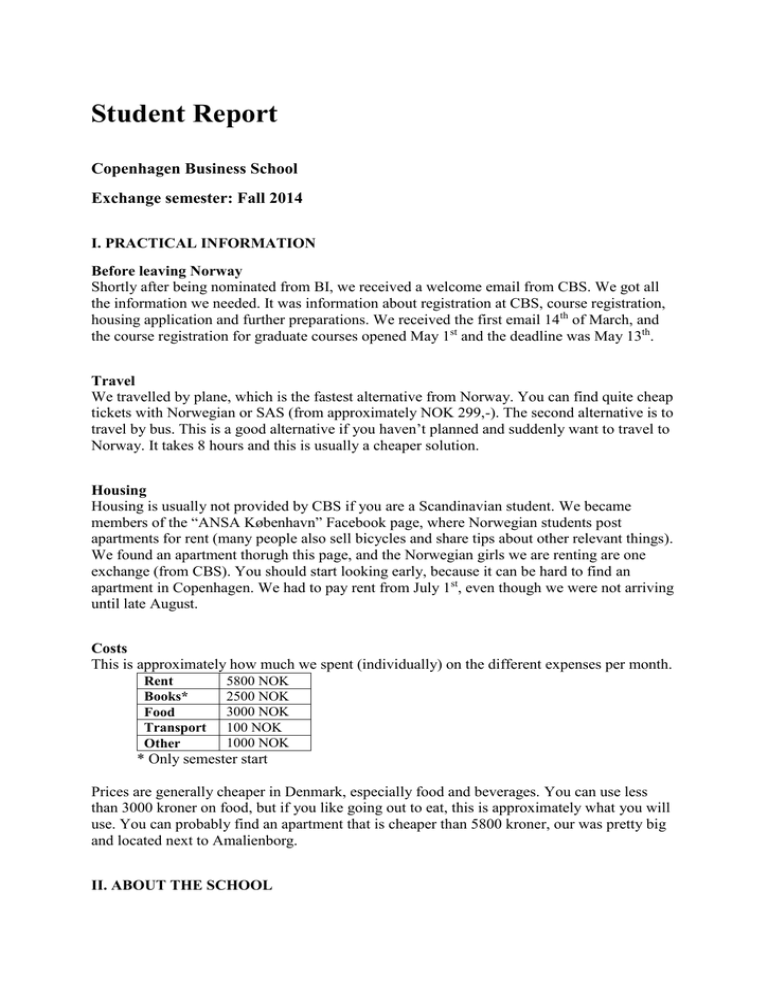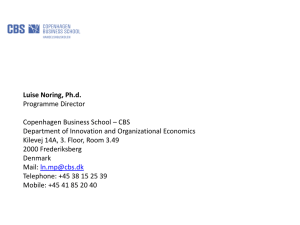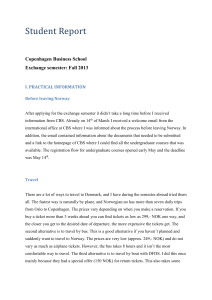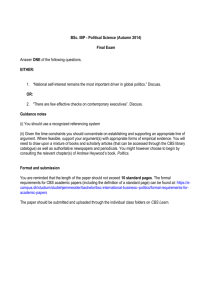Student Report Copenhagen Business School Exchange semester: Fall 2014
advertisement

Student Report Copenhagen Business School Exchange semester: Fall 2014 I. PRACTICAL INFORMATION Before leaving Norway Shortly after being nominated from BI, we received a welcome email from CBS. We got all the information we needed. It was information about registration at CBS, course registration, housing application and further preparations. We received the first email 14th of March, and the course registration for graduate courses opened May 1st and the deadline was May 13th. Travel We travelled by plane, which is the fastest alternative from Norway. You can find quite cheap tickets with Norwegian or SAS (from approximately NOK 299,-). The second alternative is to travel by bus. This is a good alternative if you haven’t planned and suddenly want to travel to Norway. It takes 8 hours and this is usually a cheaper solution. Housing Housing is usually not provided by CBS if you are a Scandinavian student. We became members of the “ANSA København” Facebook page, where Norwegian students post apartments for rent (many people also sell bicycles and share tips about other relevant things). We found an apartment thorugh this page, and the Norwegian girls we are renting are one exchange (from CBS). You should start looking early, because it can be hard to find an apartment in Copenhagen. We had to pay rent from July 1st, even though we were not arriving until late August. Costs This is approximately how much we spent (individually) on the different expenses per month. Rent Books* Food Transport Other 5800 NOK 2500 NOK 3000 NOK 100 NOK 1000 NOK * Only semester start Prices are generally cheaper in Denmark, especially food and beverages. You can use less than 3000 kroner on food, but if you like going out to eat, this is approximately what you will use. You can probably find an apartment that is cheaper than 5800 kroner, our was pretty big and located next to Amalienborg. II. ABOUT THE SCHOOL The school is in Fredriksberg and it takes approximately 10 minutes with the metro from Kongens Nytorv and about 20 minutes by bike from the city centre. The area around the school has a lot of good restaurants and a big shopping centre right outside. The school is quite big and is spread around different locations in Fredriksberg. The main building is called Solbjerg, where you can find the biggest library, but it is very popular so you normally have to reserve a seat one day ahead. Close to Lindevang metro station is Dalgas Have, where you can also find the international office. You will get a map of the different buildings when you arrive. Course registration The course registration opened on the 1st of May and the deadline was 13th of May. After registration, it takes 4-6 weeks before you get information about the courses you have been assigned to. The courses are not assigned on a first-come, first-served basis, meaning that you have until the deadline to finish your registration, without the risk of not being first in line for your course choices. The firs add/drop period startet early in August. The final add/drop period was in the end of August/ early in September. You should use your CBS calendar to check if your courses are overlapping before you make the final decision about which courses to take. Academic calendar Arrival date: First day of the semester: Last day of classes: Examination period ordinary courses: Examination period Q1* courses: 25/08-14 01/09-14 21/11-14 24/11 – 23/12 20/10 – 31/10 * Q1 means that a course is taught in weeks 36 - 43 (varies with course) – full credit course, taught in half a semester. Arrival You will get an email from CBS where you are asked if you want to have a buddy. If you choose to have a buddy, your buddy can pick you up at the airport. The introduction week was from 25.08-01.09. During the day, we had mandatory classes with information about the school, courses, exams, city, culture etc. You can also join the social events in the evening and you will receive an email about how to purchase tickets for the social package before you arrive. The International Office The international office will send you all the information you need by email and they are helpful if you need to contact them. They are located at Dalgas Have. We did not have any problems with the international office. III. ACADEMICS In the classroom The workload at CBS is almost the same as at BI. The difference in the masters program is that almost every exam counts 100 %, compared to BI’s master program where you have assigments, presentations and/or oral participation grades that counts during the semester. Description of courses and exams Course code & name Master/ Bachelor Exam form Prerequisites Approved as CCMVV1595U Online Marketing Master Miniproject and oral exam A basic understanding of marketing and consumer behavior Elective Comments Comments: The curriculum in this course was some chapters from a book called digitial marketing, but mostly articles. The lectures are similar to what we are used to from BI. The lecturer had power points and presented theories from articles etc. The course was more theoretical than we expected. We had to deliver a mini-project before the oral exam. This was 10 pages if you are writing alone and 15 in a group. You have to defend your mini-project at the oral exam, and you will also be asked other parts of the curriculum. CIBSO1002U International Financial Markets Master Written sit-in 4 hour exam None (but you should know some macroeconomi cs) Elective Comments: We think this course was really good and relevant for understanding what is going on in the financial world. For example how interest rates and currencies move and affect each other. The lecturer is very good and entustiastic. He is good at facilitating class discussions and presenting practical examples. CCMVV1316U International Logistics Management Master Oral exam None Elective Comments: This was an interesting course, but a different content from what we are used to (studying marketing). The curriculum contained one book and several articles. The lecturer was good, and we also had some guest lectures that where inspiring. The exam was a 20 min oral exam, where you could be asked about anything from the curriculum. In the beginning of the exam you draw a card with a topic, that you will start talking about. This course was a quarterly course, which means that the lecturers are only the first half of the semester and the exam is in October. CCMVV1645U Financial Statement Analysis and Valuation Master Written sit-in 4 hour exam An introductory course in financial accounting and reasonable knowledge of corporate finance Elective Comments: Since we do not have a financial accounting course from before, we asked the lecturer if it was ok to participate. We were told that a basic understanding of accounting would be sufficient. This course was very interesting and we got a lot of insight in how to evaluate companies. As marketing students, we will probably not use this directly when we start working, but we think it is important to have a basic understanding of financial issues. The lecturer was really good and did his best for the students to understand. We got small exercises before/during the lectures, that we think was useful. The curriculum for this course was a book. This course was a quarterly course, which means that the lecturers are only the first half of the semester and the exam is in October. Almost all the written exams at CBS are computer-based. Final note We have really enjoyed our stay in Copenhagen. We love the city and also the Danish people. There are not that many cultural differences, but we have noticed some funny ones. Both of us have been on exchange before, but we think CBS and Copenhagen gave us the best experience. There will definitely be a lot of trips back here and we are glad it is not that far away from Oslo. To sum up, we enjoyed every part of our stay here - both academically, socially and culturally - and can definitely recommend an exchange semester in Copenhagen.



